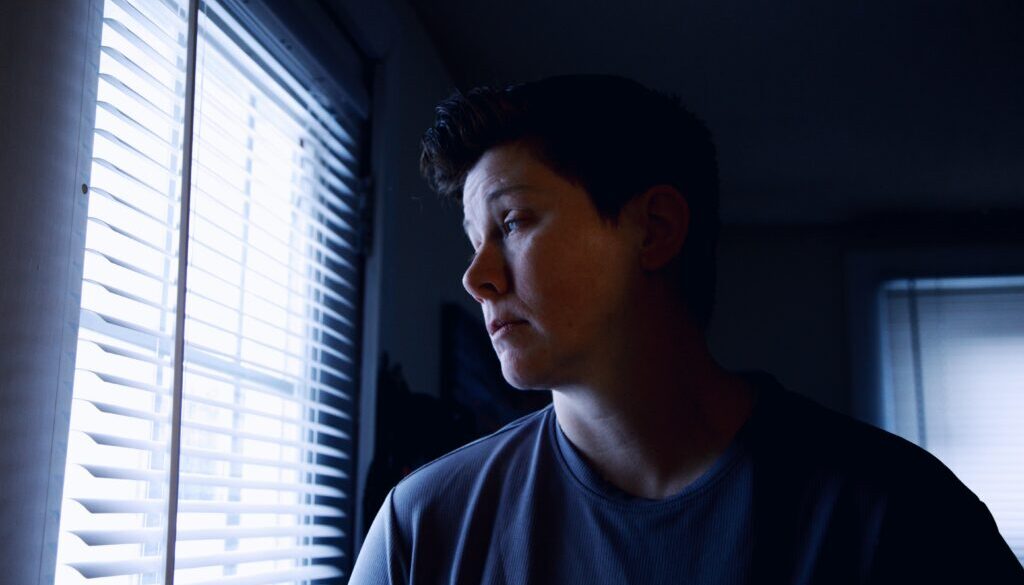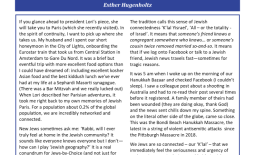From Adversity to Gratitude
This week’s Parashah could be called, well, not quite ‘four weddings and a funeral’ but close enough: two funerals and two weddings. Poignantly named ‘Chayyei Sarah’, ‘the life of Sarah’, the portion opens with the matriarch’s death and progresses through what happens to the Patriarch Abraham following this loss. Immediately, the Torah tells us that Abraham ‘mourned Sarah and bewailed her’ – ‘vayavo Abraham lispod l’Sarah v’liv’chotah.’ The Torah is ordinarily terse in its descriptors and the double description of Abraham’s condition draws the eye and primes the heart: he mourned and bewailed her. This suggests his grief was very profound; perhaps profounder than was expected or considered culturally normative at the time.
The Midrash, as quoted through Rashi, offers us one possible reason. In Pirkei de’Rabbi Eliezer, there is an ‘asmachta’, a joining between the narratives of the Akeidah and Sarah’s death. The Midrash suggests that even though Isaac survives the bitter ordeal, Sarah died from shock and horror upon hearing about her only son’s tribulation. How would a wife feel when confronted with her husband’s intention and attempt to sacrifice their beloved child? I suspect few words would suffice to illustrate the world of agony she must have felt.
It leaves us to wonder how torn up, traumatized and guilt-ridden Abraham might have felt. God promised him descendants as numerous like the stars of the sky and within a very brief timespan, he has exiled one son, alienated the other and lost his wife. It is suggested in the Torah that Abraham and Isaac never connect meaningfully again. Abraham’s mission and promise must have felt very precarious indeed.
Perhaps, in today’s language and framework, a clinician might diagnose Abraham with depression, complicated grief or another mental health condition. He is a broken man and it is natural for him to be this distressed. The Torah certainly destigmatizes the profundity of his pain by naming it openly and making space for our pain and grief. After his undefined period of mourning has ended, the Torah tells us he got up ‘from beside his dead [Sarah]’ and completed the obligations of the ‘aveil’, the mourner, by procuring a dignified burial site for his beloved wife.
There are many subplots to this emotionally rich and relationally complex Torah portion, but perhaps the overarching one is how families deal with grief, transition, change and love. We learn something of the inner world of mourners and the priorities of proper burial. The Torah does not tell us of the discreet steps taken to ensure a peaceful parting. As your rabbi, I serve on the Chevra Kadisha – the sacred burial fellowship – for women, and I know intimately the sanctity of the purifying rituals of preparing the deceased for burial. Like the terse text of the Torah, we do not talk much about these aspects of Jewish communal living but that does not make them taboo and I am happy to talk to anyone who is interested in learning more about the sacred duties of the Chevra Kadisha.
Still, this is a portion that is not just about death: the paradox is that it is very much about life, as the name ‘Chayyei Sarah’ suggests. Sarah’s presence is felt throughout as her legacy, precarious at first, is established through the marriage and lineage of Jacob to his beloved Rebecca. Chayyei Sarah is a portion that spans the entire lifecycle of families and that helps us resolve and reconcile loss and trauma into love and growth. Fewer verses in the Torah are more touching than the description of Isaac bringing Rebecca into his mother’s tent and loving her: it is a beautiful arc that started with a wounded young man from a complicated and conflicted family who found comfort and healing in the arms of a strong and compassionate young woman. But that is not where the healing ends: despite the cruel exile that Ishmael and his mother Hagar experience, there was reconciliation between the half-brothers as they came together to bury Abraham next to Sarah. Abraham had remarried by then; a mysterious woman called Keturah (‘incense’) who the tradition hints at being Hagar. From his distress at the beginning of the Parashah, the Patriarch found a quiet peace at the end of his life, among new children that he had sired and with whom, presumably, he had a less fraught relationship.
‘Life imitates art’, as the saying goes, but perhaps life also imitates the Torah. There are many secrets of love and healing locked in the words of this Torah portion, like glue holding this complicated family together. Eliezer the Damascene, Abraham’s mysterious but devoted servant, is pivotal in shifting Abraham’s legacy from precarious to secure as he finds Isaac a ife.
Eliezer, whose name means ‘My God is my help’, is an underserved and underrated character. The Midrash suggests that he went down to Sodom with Abraham to rescue Lot; we can only imagine the horrific things he may have witnessed. He is sent on a fool’s errand, it seems, from Canaan back to Haran to procure a wife, an act of dogged faith. He is loved and trusted by Abraham and his strong moral instincts immediately identify Rebecca as a remarkable woman.
Threaded throughout this narrative of loss, love and healing are golden threads of resilience and gratitude. There is a striking formulation that Eliezer utters when he realizes his mission is brought to a success. He kneels and prostrates before God and says, ‘baruch Adonai Elohei Adoni Abraham asher lo azav chasdo v’amito me’im adoni’ – ‘praised is Adonai, the God of my master Abraham, Whose true lovingkindness have not abandoned my master’. (Gen. 24:26) Eliezer is a selfless character who is able to see the larger plan and the greater perspective. I am not sure whether this is the first time that a Biblical character has used this blessing formula that is so well-known to us, ‘baruch Adonai’, but interestingly, there was no commentary on this verse.
It is gratitude and perspective that brings the disparate parts of this portion together. There is loss, but also renewal. There is risk but also a sense of coming home. There is strive but also reconciliation. Parashat Chayyei Sarah threads golden hints through our own hearts about how to navigate our own relationships; with family, friends or even beyond. As we move into the Thanksgiving season, we may have a range of emotions about assembling our families and friends at our table; at how to navigate difference and diversity within our own ‘tribes’, our ‘mishpachot’ and how to practice life-giving gratitude in an uncertain world. From darkness to light, with loved ones coming together in life’s most important moments. Where love is brought into dwellings and comfort follows close by. As we feast at our tables; alone or with others, may our hearts hold this more rich and mature form of gratitude. Let’s love on each other, friends, give thanks and hold the joy of our finite existence before the Infinite.



